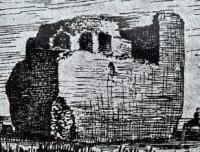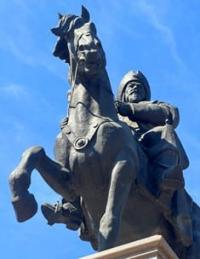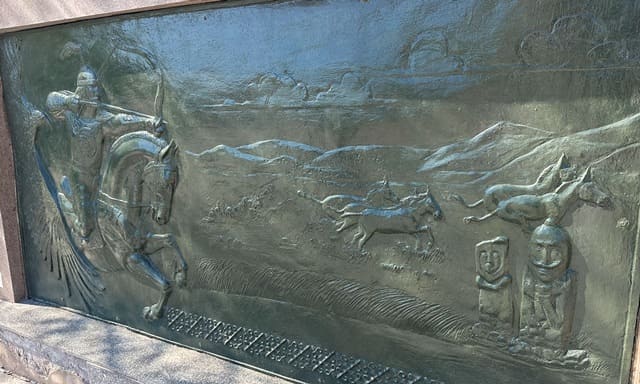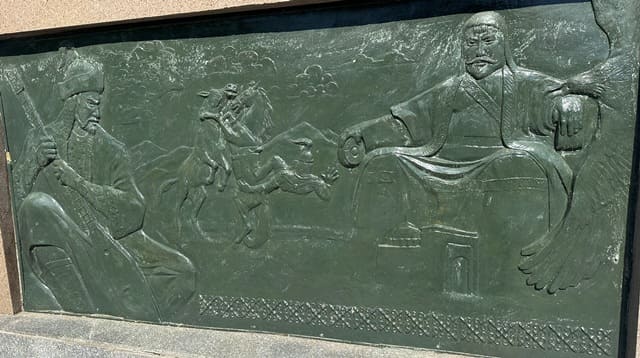Вы здесь
Zhoshy khan in written sources and legends.



Legends of Ulytau.
"Don't hesitate, don't run, don't stand
You're right there, since you decided to fight,
Thousands of horse and foot
I have those fit for battle.”
Rashid-Ad-Din. "Collection of Chronicles". Jami At-Tavrikh about Hulagu Khan, the son of Tului Khan, the son of Genghis Khan.
Architecture of mausoleums in Ulytau.
The Zhoshykhan mausoleum is located 47 kilometers northeast of the city of Zhezkazgan. It stands on a high hill on the left bank of the Karakengir River and is clearly visible from afar. According to its architectural type, the mausoleum belongs to the portal-dome structure.
Despite its relatively small size, the monument is a monumental structure, which is achieved by the precision of the proportions of volumes, lines and the skill of the architect. Essentially, this is the only monument in Eurasia erected in honor of a member of Genghis Khan’s family.
But, despite the historical significance of Zhoshy Khan’s personality, many people have little idea of who Zhoshy Khan was and when he lived. In our opinion, being the eldest son of Genghis Khan, Zhoshy is one of the most mysterious and little-studied personalities in the history of the Mongol Empire of the 13th century. Fate prepared for him one of the leading roles in the formation of Mongolian statehood and the spread of its influence over the vast Eurasian continent.
Zhoshy himself and his direct descendants played a significant role in the history of the formation of Kazakh statehood. However, poor knowledge of his biography has led to the fact that only legends, sometimes unconfirmed, remain around Zhosha’s life.
Legends and tales associated with the birth and life of Zhosha have been preserved to this day, both in written form and in oral folk art. According to sources, Zhoshy was born from the eldest wife of Genghis Khan - Borte, daughter of Dai-noyon, from the Kongirat tribe.
She had four sons: Zhoshy, Chagatai, Ogedei and Tole, among whom the father divided his huge empire during his lifetime. Interesting information regarding the birth of Zhosha Khan is provided by Bartold V.V.
In his work “Works on Central Asia” he writes: “At the time when Genghis Khan fought with the Merkit tribe, and they defeated him, Borte-fujin was pregnant with Jochi. The Merkit tribe took her captive. At that time, there were peaceful relations between the Merkit tribe and On-Khan, they sent her to On-Khan.
He Khan held her in honor and respect because of the old friendship that he had with Genghis Khan’s father, looked at her as a daughter-in-law, and called Genghis Khan his son.” Tizengauzen V.G. in his work “Collection of Materials Relating to the History of the Golden Horde” reports the following:
- “Genghis Khan sends Emir Saba from the Jalair tribe to Ong Khan to bring Borte to him. Ong Khan, having paid due attention to Sabu, handed it to him. As they headed towards Genghis Khan, Jochi was born along the way.
Because the path was dangerous, there was no way to stop and arrange a cradle for the baby. Saba kneaded a dough with a small amount of flour and wrapped Jochi in it. Taking it into his lap, he carried it carefully so that it would not hurt him. They named him Jochi."
It is interesting that the name Jochi, in the Kazakh transcription of Zhoshy, is very consonant with the Kazakh word “zholaushy”, which means “traveler”. It can be assumed that perhaps he received his name due to his birth on the road. Translated from Mongolian, the name Zhoshy means “unexpected guest.”
These events, according to most researchers, happened in 1182 - 1183. Today we have practically no reliable information about his childhood. This is primarily due to the fact that most authors paid more attention to Genghis Khan than to his family.
But with a high degree of confidence we can assume that Zhoshy spent his youth years not as easily as some people think. It was during this period that Genghis Khan waged a complex military-political struggle with his neighbors, aimed at strengthening his power directly in Mongolia.
There was a time when Genghis Khan was forced to hide for a long time with his family from enemies, and this, of course, implies a limitation of comfort and stability, if we can talk about any comfort at all in conditions of a constant military threat.
One thing is clear that from childhood Zhoshy was ready for drastic changes in life situations, and it was during this period of his life that he began to develop as a wise man. politician and talented military leader. Tizengauzen V.G writes: “Growing up, he was always his father’s inseparable companion and interlocutor and his accomplice in happiness and misfortune.”
By the turn of the new century, a more favorable situation had developed for Father Zhosha, and in 1206, Genghis Khan was proclaimed ruler of the Mongols at a general kurultai. Around the same time, Genghis Khan allowed his first-born to take an active part in the political life of the nomadic tribes concentrated under his power.
Between 1207 and 1215 Genghis Khan succeeded in a number of successful military campaigns, as a result of which the Xi Xia state, the Uyghurs of East Turkestan, Northern China, the Karluks, the Jin state and others found themselves in vassal dependence on the Mongols.
Without going into details of all these military companies, we will only highlight Zhoshy’s participation in them. In the winter of 1207 - 1208 Zhoshy, at the age of 25 - 26 years old, on the instructions of his father, subjugated the Yenisei Kyrgyz and other “forest peoples” of southern Siberia, from the lower reaches of the Selenga to the Irtysh.
Returning from a campaign against the Tanguts, Genghis Khan in 1208 allocated him an ulus of “forest peoples,” adding to his horde all the lands that would be conquered in the west “to those places where the hooves of Mongol horses would reach.”
Initially, Zhosha's headquarters was located on the Irtysh River. According to Nesevi's story, in the summer of 1216, Zhoshy Khan defeated the Merkits who fled to the Torgai region, where he met with the sixty thousand-strong army of Sultan Muhammad.
Zhoshy and his military leaders Subedei and Jebe did not want to enter into battle with the army of Khorezmshah, declaring that they were carrying out Genghis Khan’s task to destroy the Merkits. The Sultan replied that he considered all infidels enemies and forced the Mongols to accept the battle.
The beginning of the battle did not bring victory to either side, despite the numerical superiority of the Khorezmshah’s troops; in both armies, the right wing defeated the enemy’s left wing. Considering the obvious unfavorable balance of forces, Zhoshykhan, as a wise commander, made the only correct decision: in order to avoid defeat, he ordered fires to be lit at night, creating the appearance of presence, and secretly retreated.
Zhosha's retreat was not a flight of the Mongols, but only a planned postponement of the inevitable future confrontation between two powerful powers. In 1218, the peoples living near Lake Baikal rebelled against the Mongols.
Genghis Khan demanded that the Kyrgyz, who had submitted to him at one time without military action, send an army to suppress the uprising. However, the Kyrgyz not only did not comply with his demands, but also rebelled. Under the leadership of Zhoshykhan, a punitive expedition was sent, which pacified the Kyrgyz and returned.
According to the Chinese source Yuan-chao-bi-shi (“The Secret History of the Mongols,” 13th century), this campaign of Zhoshy dates back to 1207. But what is interesting about this fact is not the discrepancy in the dates of the campaign, but something completely different: when studying the biography of Zhosha, one gets the impression that he played the role of a kind of “overseer” in the state, whose services were resorted to from time to time to resolve various military-political situations.
The destruction of the trade and diplomatic caravan of the Mongols by the ruler of Otrar served as a formal reason for the start of hostilities. Genghis Khan allocated several tumens (a large organizational tactical unit of the Mongol army of the XIIth - XVth centuries) under the leadership of his sons Chagatai and Ogedei and in 1219 besieged the city, and divided the rest of the army in half.
One detachment, consisting of 5,000 people, was sent up the Syr Darya River, and the other, led by Zhoshy, was sent down the river. These detachments had already completed their tasks by April 1220. The forced conquest of this region of Central Asia was determined by Zhoshy’s personal interest in expanding the borders of the Ulus, intended for him by Genghis Khan when dividing the empire between his heirs.
Details about this campaign of Zhoshykhan are reported only by Juvaini. After a six-month siege in April 1221, the capital of Khorezm, the city of Gurganj (Urgench), fell. The relatively long period of time between the siege and capture of the city is explained by disagreements between Zhoshy and Chagatai.
Zhoshy wanted to keep the city intact, since this rich city was supposed to be part of his ulus, and therefore he repeatedly invited the residents to surrender without a fight. Chagatai, in turn, insisted that the town be taken by storm.
Genghis Khan, having learned about the discord between his sons, instructed Ogedei to lead the capture of the city. Zhoshykhan’s kindness and mercy were once appreciated by L.N. Gumilyov in his work “From Rus' to Russia”.
He writes the following: “There were some persistent stereotypes in Jochi’s behavior that greatly distinguished him from Genghis Khan. If for Genghis Khan the very concept of mercy towards enemies did not exist, he left only small children, then Jochi was distinguished by his humanity and kindness.”
During the siege of the city of Gurganj, when the Khorezmians asked to accept surrender, i.e. to spare them, Zhoshy spoke out in favor of showing mercy, but Genghis Khan rejected the request for mercy. Unfortunately, as L.N. writes.
Gumilyov: “... the misunderstanding between father and son deepened over time and turned into the sovereign’s mistrust of his heir.” As you know, Zhoshykhan’s relationship with his father in the last years of his life and the circumstances of the former’s death are presented differently in sources.
Thus, Juzjani in his work “Tabakat-i Nasiri” writes: “Being extremely brave, courageous and warlike, having seen the air and water of the Kipchak land, I found that in the whole world there cannot be land more pleasant than this, air better than this, water sweeter than this , meadows and pastures wider than these, the desire to rebel against his father began to penetrate his mind.”
Researchers explain the desire for independence and some alienation from the house of Genghis Khan by the father’s restrained hostility towards Zhoshy, who was born after his mother Borte-fojin was in Merkit captivity.
The brothers Chagatai and Ogedei, out of a sense of rivalry, also disliked him and, when the opportunity presented themselves, made repeated attempts to discredit Zhoshy in front of their father. Over time, the desire for independence began to intensify as the Zhosha ulus expanded and became increasingly distant from Genghis Khan’s headquarters. In his ulus, Zhoshy felt calmer, the local population supported him, and he was respected among the family nobility.
The nomadic tribes who then lived in Desht-i-Kipchak were subjects of the Khorezmshahs, but never depended on the latter, since their vassalage was formal. The influence of Khorezm did not spread north of the Syrdarya cities, so the appearance of “brotherly nomadic tribes” did not cause mass resistance among the local population.
Moreover, the Mongols pursued a subtle policy towards the nomads; many tribes retained the pastures that they had before the arrival of the Mongols. It is these reasons that caused the fact that a significant part of the Mongol troops were tribes living on the territory of modern Kazakhstan, who fought, if not for the expansion of their lands, then at least for their immutability.
Zhoshy Khan did not approve of Genghis Khan’s methods of mass terror, and, according to Juzjani, he told those close to him: “Genghis Khan has gone crazy that he is destroying so many people and destroying so many kingdoms. It seems to me that it would be most expedient to kill my father while hunting...” Further, Juzjani reports: “His brother Chagatai learned about such a plan and informed his father about this treacherous plan and his brother’s intentions.
Having learned this, Genghis Khan sent his proxies to poison and kill Zhoshy.” By this time, Zhoshy had great political and military power and could easily field a combat-ready army against his father, and Genghis Khan began to be afraid of his eldest son.
This confrontation is reported by Rashid al-Din. According to him, “after the conquest of Khorezm, Jochi Khan headed to the Irtysh, where his carts were located, and joined his hordes. Before that, Genghis Khan ordered Jochi to set out on a campaign to conquer the northern regions, such as: Kelar, Bashgird, Urus, Circassian, Dasht-i-Kipchak and other regions of those regions.”
But Zhoshykhan did not follow his father’s orders. Genghis Khan became very angry and said: “There will be no mercy for him, I will put him to death...”. After this, Genghis Khan ordered him to be summoned several times, but he replied that he had suffered from illness and could not go to his father’s headquarters.
Realizing his difficult situation, Zhoshy moves his headquarters to the Ulytau Mountains, where he found his new home among the local population. Rashid ad-Din writes: “Meanwhile, one Mongol from the Mangyt tribe, who arrived from the Juchi yurts, said that he saw Zhoshy hunting near a mountain.
For this reason, the fire of Genghis Khan's rage was kindled, and, imagining that Jochi had obviously rebelled and therefore did not pay attention to his father's words, he sent Chagatai and Ogedei with an army against him, intending to follow them.
However, the campaign was canceled, since at that time the news of Jochi’s death arrived.” One can now only guess about the reasons for Zhosha’s death. Probably, Zhoshy hastened to think about independence and open confrontation with his father, without gaining the necessary strength and without enlisting the support of the Mongol nomadic nobility.
The perpetrator of the murder may have been people from among his associates, who, apparently, were frightened by the prospect of war with Genghis Khan. In addition to this version of his death, the legend that still exists among the Kazakhs about the mysterious death of Zhosha, recorded by Aldzhanov and published in the Kyrgyz Republic, is interesting. steppe newspaper (No. 14. Omsk, April 16, 1897) “The Legend of Alasha Khan and his son Dzhachi Khan.”
According to this legend, Zhoshykhan was the son of Alashakhan, who fulfilled any whims of his favorite. Having matured, Zhoshykhan organized rich feasts with competitions of wrestlers, riders, shooters and won victories in all these competitions.
After each feast, Zhoshykhan, accompanied by his peers, went hunting. Alashakhan strictly ordered Zhoshykhan’s retinue, who accompanied him on the hunt, to take care of the prince’s safety. “Woe will be to you all, if something bad happens to him, I will pour melted lead into the mouth of the unfortunate person who first informs me about Zhosha’s death.”
One day, while hunting, Zhoshy became carried away in pursuit of one of the kulans and separated from his retinue. The pursued animal joined a large herd, which, at the sight of the hunter, did not run, but huddled together.
Zhoshykhan struck one animal after another with arrows, and they, suddenly enraged, rushed at the hunter and began to tear him with their teeth, trample him with their hooves, until all that was left of Zhoshykhan was his little finger, which was picked up by his companions who arrived later.
No one dared to report the misfortune to Alashakhan. The kobyzist of Ket-Bug - Ulug-Dzhirchi - volunteered to notify about the death of Zhoshykhan. Sitting down in front of the almighty khan, Ket-Buga took the instrument in his hands.
The strings made sad sounds - motives of separation, sadness, grief, despair. And the kobyz sang and groaned as if alive, and he spoke in a human voice: “Your son is dead, your son is dead...”. The kobyz, whose neck was filled with lead, paid for the difficult news.
A similar legend is found in the work “Shajarak al-atrak”, in which Ulug-Jirchi, a close associate and one of the great emirs of the court, told Genghis Khan the news of the death of his eldest son. In response to Ulug-Jirchi, Genghis Khan allegedly uttered the Turkic jir:
Kulynyn zhogaltkan kulanday kulynymnan ayyryldym
“Or ushkan akkuday er ulymnan aiyryldym.”
“Like a kulan that has lost its cub,
I am separated from my child,
Like a flock of swans scattered in different directions
I am separated from my hero son.”
In the legends of the death of Zhoshykhan, the motif of the “kulan” is repeated in various versions. So, Radlov V.V. wrote down the Kazakh legend that when they did not have a khan, they turned to the great Genghis Khan with a request to give them his son Zhoshy as their ruler.
As a little boy, Zhoshy fell into a herd of kulans. These events are reflected in the Kazakh legend “Aksak-kulan Zhoshykhan”. The folk legends about Zhoshykhan, in particular about his death, which have survived to this day, are remarkable. These legends also have different versions.
Here is one of them:
“Aksak kulan, Zhoshy
Kulan neden shoshygan
Balandy kulan zhep ketti,
Nanbaymysyn osygan"
The legendary motif of “kulans” is also found in “Chingiz-Nama”. The author of “Chingiz-name” reports the following: “Zhoshykhan was the eldest of his sons. He gave him a large army and, sending him to Desht-i-Kipshak, said: “Let it be pasture for your horses.”
When Zhoshykhan went to Desht-i-Kypshak, he reached Ulug-Tag. One day, when he was hunting in the mountains, he came across a herd of red deer. Chasing him and shooting arrows, he fell off his horse, broke his neck and died.”
It is necessary to emphasize here that “the custom of executing people of khan’s origin without shedding blood” in those days was a frequently practiced method of killing a person. To this day, the people have preserved a piece of music performed on the dombra without words “Aksak-kulan”, supposedly announcing the death of Zhoshykhan.
In "Chingiz-Nama" you should pay attention to the place of death of Zhoshykhan - Ulytau. Thus, the written information of medieval authors about the mysterious death of Zhoshy is confirmed by legends, indicating the same place of Zhoshy’s death. This is also evidenced by the location of his mausoleum - in the Ulytau region.
According to one of the sources of the XVth century, “Shajarat al-atrak,” Zhoshykhan died six months before the death of his father, i.e. in February 1227 at approximately the age of 40 - 45 years. Zhoshy died in the prime of his strength, and only his death prevented an open confrontation with his father.
He was an extraordinary personality: a wise politician, a talented and successful military leader, whose importance in Russian history is difficult to overestimate, given the fact that all Kazakh khans are direct descendants of Zhosha.
Grateful descendants erected a beautiful mausoleum in honor of Zhosha, which has been preserved in good condition to this day. Against the backdrop of the endless steppe, it organically fits into the surrounding landscape, symbolizing the harmony of the creations of man and nature.


Authority:
Chief specialist of the Historical and Industrial Museum named after K.I. Satpayeva Arman Bermagambetov. Article “Zhoshykhan in written sources and legends associated with it.”
Photos by:
Alexander Petrov.







